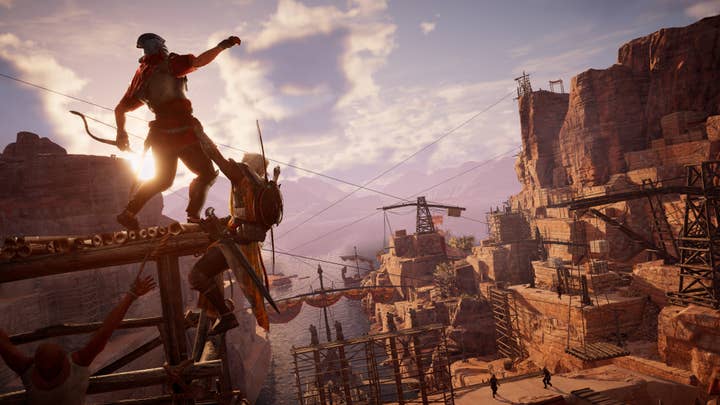Reclaiming Assassin's Creed's lost identity
Creative director Jean Guesdon tells us how Origins will reaffirm what the epoch-spanning series is really all about
It's safe to say Assassin's Creed has suffered something of an identity crisis over the years.
During the last decade, it has evolved from a stealth-centric affair into a mainstream action adventure series, taking detours into other sub-genres such as open-world pirate escapades and 2.5D platforming.
Simultaneously, the conversation around the series has shifted from excitement for a promising new IP to criticism about increasingly formulaic entries and a series in dire need of a shake-up.
Ubisoft is promising that reinvention in today's release, Assassin's Creed Origins. The game marks the tenth anniversary of the publisher's flagship franchise by not only telling the origin story of its titular brotherhood but also transforming the game into an open-world outing, giving players access to the entirety of Ancient Egypt.
"We know who we are. Assassin's Creed is about enabling people to immerse themselves in a pivotal moment in history... in a compelling, attractive open world"
But does this also not show a lack of focus from the series? These titles always seem to be principally about executing important targets, but Origins also sees players diving for treasure, fighting in gladiator arenas and petting cats. As with Black Flag, Assassin's Creed Origins looks like a high-quality game but not very 'assassiny' (for want of a better word).
"We know perfectly well who we are," creative director Jean Guesdon assures GamesIndustry.biz. "The series has evolved, and Assassin's Creed Origins is actually moving the franchise forward and we're clearly moving towards a more RPG-like action adventure game. That actually started with AC2, which was truly an action adventure game. AC1 was much more focused on stealth, but AC2 was where we really established the fundamentals.
"An Assassin's Creed game is about enabling people to immerse themselves into a very pivotal moment in history, meet legendary characters, and play a bit with conspiracies in a compelling, attractive open world that will let them play the way they want as much as possible. This remains the same."

Even so, few blockbuster franchises have seen their core gameplay migrate so far away from that of the original title. Guesdon attributes this not to desire for a wider audience, but instead the choice of setting - something that dictates more than just the structure of each game.
"We're removing all narrative barriers for potential newcomers. If the gameplay is accessible enough, this allows everyone to jump in - fans and non-fans"
"When making Asssassin's Creed III, for example, and doing the American Revolution, we couldn't do that without the frontier," he says. "The British Colonies back in the day were just a small area on the Atlantic Coast, and all the rest was nature. Not mentioning that, not using that in the game would have been a mistake. In the same way, the war was also being won at sea so that's why we brought in naval battles.
"Black Flag was about pirates so it was different, but then it was still Assassin's Creed on land and pirates at sea. This time, with Assassin's Creed Origins, we knew that in order to deliver this incredible setting of Ancient Egypt we needed to develop the entire country. That's why we came up with this massive open world, totally seamless from the top of the mountains to under the water."
It's perhaps not the best time to venture into the open-world space given how many entries we've seen over the past few years. Even more recently, Middle-Earth: Shadow of War - already an Assassin's Creed rival in gameplay - has only just released and Zelda: Breath of the Wild will no doubt enjoy a fresh surge of sales as Nintendo ramps up for Switch's first Christmas.
Then there's the ongoing criticism that Ubisoft's games are becoming increasingly homogenous. Upon announcement, Origins' promises of reinvention were immediately countered by comparison's between Bayek's eagle and the drone from Ghost Recon Wildlands - yet another open-world game that launched earlier this year.

When asked how Ubisoft has made Origins unique and broken away from the open world tropes - many of which have been set by the publisher itself - Guesdon reasons that the nature of these games makes this very difficult to do.
"[Everyone] doing an open-world game - and this is valid for other games, not just Ubisoft ones - faces the same problems," he says. "At some point you come up with solutions that might resemble ones that others have already used.
"We always start from the game we want to make, and what makes sense in that game. Which features make sense? The grappling hook in Assassin's Creed Syndicate, for example, made perfect sense because London was the highest city we have ever had. Some buildings are six, seven stories high so we needed something to be able to climb very fast - that came from that need. With Assassin's Creed Origins being a very different world, we came up with different options."
He goes onto add that Bayek's eagle "has a purpose" and one that stretches beyond the function of Ghost Recon's drone: it is another portal into this vast environment Ubisoft has brought to life.
"We made a giant world which is totally filled with AI that's persistent and global, so all living beings in the world really live - even far away from Bayek," Guesdon explains. "This is very interesting because it creates situations that we developers didn't predict.
"So why the eagle? Yes, partly for the strategic perspective on nearby locations, but we also wanted it to have a new perspective on a much bigger scale, so you can see the world live very far away and set yourself objectives. That has nothing to do with other games."

Still, the pressure is on to deliver on claims that Origins will both reinvent and reinvigorate a series many have accused of fatigue - particularly in the years since Black Flag. In fact, in Ubisoft's own words, taking a year off for the first time since 2008 was in order to allow the developers more time to reevaluate where Assassin's Creed fits in today's market.
But Guesdon warns that Origins does not throw out the entire formula. While its evolution may have slowed in recent years, the games have still sold well enough that there is a significant audience to satisfy. Plus, the creative director reminds us, there have still been innovations with each new Creed.
"[Everyone] doing an open-world game faces the same problems. At some point you come up with solutions that might resemble the ones others have used"
"In all Assassin's Creed games... when it comes to gameplay, we always strive to bring some new things," he explains. "With Assassin's Creed Origins, we wanted to take a major leap forward and modernise the experience, which is why we touched so many new other things: bringing in the eagle, the ability to swim everywhere, to climb rocks, to shoot arrows, merging the melee combat with the ranged. All the gameplay is really the modern path, moving to RPG."
The publisher also hopes that by crafting something new, it minimises the need to have played previous titles to fully enjoy it. This also makes the origin story it tells a perfect entry point for a new generation of players, and hopefully opens fresh avenues for growth.
"We're removing all kinds of narrative barriers for potential newcomers," says Guesdon. "They don't need to know anything about our universe, and if the gameplay is accessible enough this narrative situation allows everyone to jump in - fans and non-fans."
However, it's the expanded and accessible gameplay that Ubisoft is most confident will ensure Origins success. The original Assassin's Creed promised players the freedom to choose how to eliminate their targets, and this year's entry ultimately extrapolates that ethos and applies it to the entire experience. There's a reason, Guesdon says, why open-world games are so plentiful right now.
"We can bring in new players to our games by offering them options," he says. "This is why we wanted to make sure Assassin's Creed Origins would provide players with many different options so they can play the way they want. The best representation of that is the abilities menu: we have ability graphs players will be able to invest points in, whether that's in warrior, hunter or seer dimensions. This was important for us because it really helps you to craft your own play style.
"More and more, open-world games - not just Assassin's Creed - are open buffets for players. They offer a huge environment with tons of stuff to do and if we provide players with choices on how to play the games, then they will become the real creators of their final experience. We're providing a set of tools they can have fun with."
